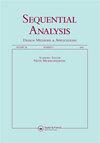Purely sequential estimation problems for the mean of a normal population by sampling in groups under permutations within each group and illustrations
IF 0.6
4区 数学
Q4 STATISTICS & PROBABILITY
Sequential Analysis-Design Methods and Applications
Pub Date : 2020-10-01
DOI:10.1080/07474946.2020.1826786
引用次数: 3
Abstract
Abstract Purely sequential estimation for unknown mean ( ) in a normal population having an unknown variance ( ) when observations are gathered in groups has been recently discussed in Mukhopadhyay and Wang (2020). In this article, we briefly revisit two fundamental problems on sequential estimation: (i) the fixed-width confidence interval (FWCI) estimation problem and (ii) the minimum risk point estimation (MRPE) problem. However, we substitute the estimators defining the stopping boundaries with newly constructed unbiased and consistent estimators under permutations within each group. These new estimators incorporated in the definition of the stopping boundaries have led to tighter estimation of requisite optimal fixed sample sizes. We have analyzed the first-order and second-order asymptotic properties under appropriate requirements on the pilot size. Large-scale computer simulations and substantial data analysis have validated such first-order and second-order results. The methodologies are illustrated with the help of time series data on offshore wind energy.正态总体均值的纯序列估计问题——在各组内的排列下分组抽样和图解
Mukhopadhyay和Wang(2020)最近讨论了在群体中收集观测值时,对具有未知方差()的正常总体中未知均值()的纯顺序估计。在本文中,我们简要地回顾了序列估计的两个基本问题:(i)固定宽度置信区间(FWCI)估计问题和(ii)最小风险点估计(MRPE)问题。然而,我们在每组内置换下用新构造的无偏一致估计量代替定义停止边界的估计量。这些新的估计量纳入了停止边界的定义,导致对必要的最佳固定样本量的更严格的估计。我们分析了在适当的导频尺寸要求下的一阶和二阶渐近性质。大规模的计算机模拟和大量的数据分析已经验证了这种一阶和二阶结果。这些方法通过海上风能的时间序列数据加以说明。
本文章由计算机程序翻译,如有差异,请以英文原文为准。
求助全文
约1分钟内获得全文
求助全文
来源期刊

Sequential Analysis-Design Methods and Applications
STATISTICS & PROBABILITY-
CiteScore
1.40
自引率
12.50%
发文量
20
期刊介绍:
The purpose of Sequential Analysis is to contribute to theoretical and applied aspects of sequential methodologies in all areas of statistical science. Published papers highlight the development of new and important sequential approaches.
Interdisciplinary articles that emphasize the methodology of practical value to applied researchers and statistical consultants are highly encouraged. Papers that cover contemporary areas of applications including animal abundance, bioequivalence, communication science, computer simulations, data mining, directional data, disease mapping, environmental sampling, genome, imaging, microarrays, networking, parallel processing, pest management, sonar detection, spatial statistics, tracking, and engineering are deemed especially important. Of particular value are expository review articles that critically synthesize broad-based statistical issues. Papers on case-studies are also considered. All papers are refereed.
 求助内容:
求助内容: 应助结果提醒方式:
应助结果提醒方式:


